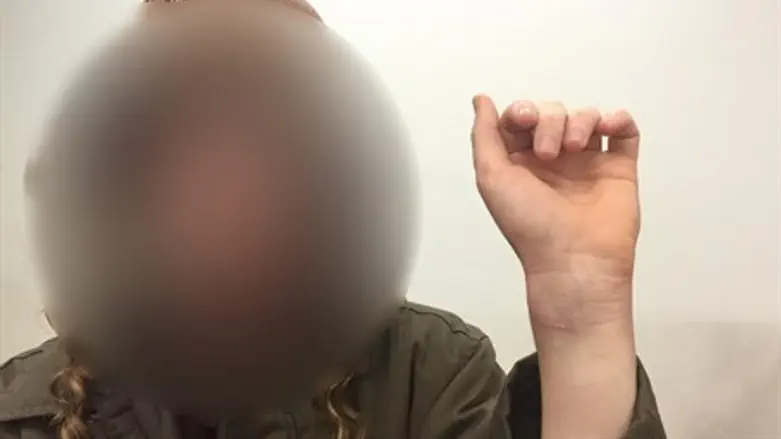
The lawyers of one of the minor Jewish suspects being interrogated in the lethal Duma arson case photographed his wrists, to prove his claims before the court that he attempted to commit suicide to put an end to the alleged brutal torture by the Israeli Security Agency (ISA).
After the minor revealed last week that he tried to commit suicide and was ready to confess to anything just to get the interrogation to stop, the ISA and subsequently Jewish Home ministers Naftali Bennett and Ayelet Shaked denied that he tried to slash his wrists.
The minor's lawyers saw the cuts on his wrists when they were allowed to finally meet him after 21 days in which he was denied legal consultation.
Upon discovering the scars from the cuts, they demanded that they be documented in the investigation file, and it was revealed that his wrists had been shown to the judge. Afterwards the youth was placed under observation by the Israel Prison Services (IPS), and underwent several psychiatric checks.
Only this week, two weeks after the incident, was permission given to photograph the youth's wrists and the cuts on them which have scarred over in the meantime; clear scars remain visible however.
Attorney Chai Haber, who is representing the minor for the Honenu legal aid organization, said, "one picture is worth a thousand words."
"In the state of Israel a youth is interrogated, tortured until he reaches a state in which he tries to end his life. It was sad to read the denials of the incident by the interrogation unit, and the attempt to throw sand in the eyes of the public, when the matter is documented and recorded in the investigation file."
"I would imagine that after the investigation materials are revealed, and along with the degree of the torture and blows, the unusual conduct in this investigation is published, the public will be shocked and will know where the truth is and where the lies are," added the attorney, noting on the media gag order on the case.
ISA issued a statement in response, saying it "is a state organization and all of its activities are conducted according to the law. Shabak (ISA) investigations are conducted in accordance with the instructions of the law and rulings, and are under the supervision of the attorney general, the state attorney and the courts. The claim that one of the detainees tried to commit suicide has no basis."
"Can the court stop the torture?"
In court last week, it was revealed that the psychiatric counselor determined that the minor suspect had been driven into severe depression and traumatic stress as a result of the investigation; he also had been prescribed sleeping pills by a doctor in his detention center due to sleep deprivation related to interrogation and torture.
"I beg Your Honor, I cannot endure this," the youth stated, in a recording that was played back to the boy's family. "Does the court have a way to control the investigation? They hung me upside down by hands until they burned. I feel like they're burning me up."
Testimony also revealed that the ISA kicked the youth in the chest while he was handcuffed with his head bent, stopping him from breathing for a few minutes. At the time, the youth asked to consult with his lawyer, and was refused; he was also forced to listen to music on Shabbat as he was interrogated, which is forbidden on the Jewish day of rest.
The torture only grew worse, he revealed, to the point where the ISA kept him up most nights torturing him. Among other things, the ISA spent an entire night flogging the youth's back, he said, and he begged the judge for medical treatment and legal counsel.
"I would confess to everything, but I don't know how - I don't have anything to tell them," said the suspect to the judge.
One minor suspect in the case reportedly broke down and confessed last week after nearly a month of interrogation, but suspects have alleged brutal torture in the interrogation, raising concerns that the confession may have been false and inadmissible as evidence. Prior to the confession, officials admitted there was no evidence against the suspects.
Further raising questions regarding the basis of the investigation is the fact that on Tuesday, the Lod District Court ordered one of the suspects to be released to a 10-day house arrest.
After being held for 29 days - during the first 20 of which he was denied legal consultation - police asked to extend his arrest based on alleged involvement in a completely unrelated quarrel with Bedouin shepherds two years ago, in a surprising request thrown out by the court.